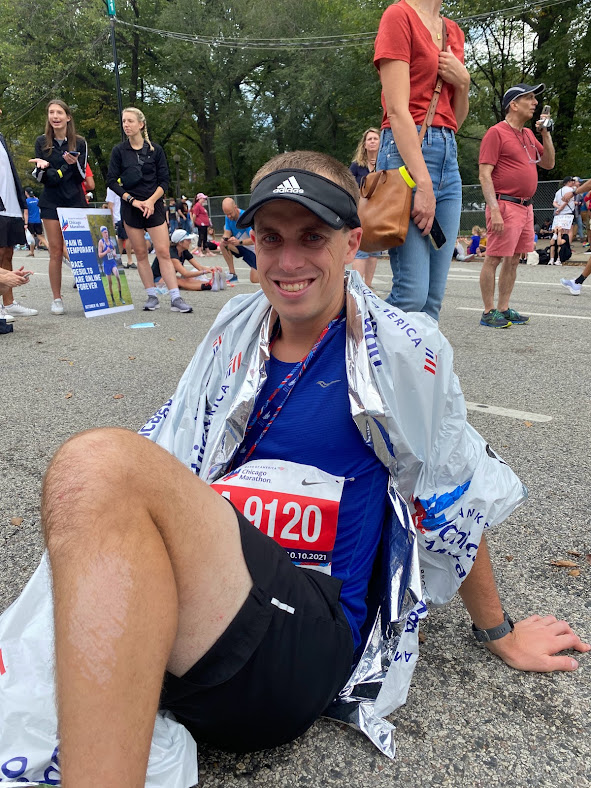As an athlete, it can be crushing when your event or game doesn’t go as you had planned. It is unavoidable, as even the best of athletes will have performances that don’t live up to their expectations. Eliud Kipchoge, our generation’s greatest marathoner, dealt with a tough race just last year at the London Marathon. For most of his marathon career, he had looked unbeatable, but suddenly people started to question his ability. However, just a year later he bounced back from that bad race and was crowned Olympic Champion in Tokyo after a dominant performance. Eliud knew how to bounce back and I will share with you some things I’ve learned on how to deal with disappointing experiences.
I’ve had many ups and downs in my running career. Most recently, the 2021 Chicago Marathon did not go the way I had planned. I was fully trained and prepared myself leading up to the race, but 17 miles into the race my body started to shut down from exhaustion. I ended up grinding it out to the finish line, but lost about 25 minutes in those last 9 miles. Saying I was disappointed would be a major understatement. It had been 2 years since my last race and was my first World Major Marathon. I was looking forward to running a fast time amongst the world’s best competition. Sometimes things go exactly to plan and when they do, it feels unbelievable. However, when things don’t go well, it can be crushing. I’ve learned a lot from some of my bad race experiences and here’s how to grow from them and move forward with your running career.
Analyze the Situation
Ok, I know this is easier said than done. In the first few moments when things start to go sideways, it can be mentally crushing. Be prepared to analyze the factors at hand to make the best decision. Assessing what is going wrong and why is crucial during this time. Questions to ask yourself:
- Is my body trying to tell me it is hurt or needs attention?
- Have I had this pain or discomfort before?
- Is this an issue that might go away or will I make it worse if I continue?
- Is there anything I’ve tried before in this situation that has helped me bounce back?
The important thing when you first begin to feel discomfort is to try to diagnose what is causing the issue. It is not worth risking a longer term injury for one race. However, you will likely need to alter your race strategy to compensate for the discomfort you are feeling. Stomach issues, some cramps, or blisters can be things that you can try to remedy on course.
Advertisement – Keep Scrolling for Rest of Article
Make a Decision
Depending on what is ailing you, you might be able to continue on while assessing or it may be best to stop immediately and get help. Either way, you need to be able to make a decision in the moment that will best help you bounce back. Of course, every situation will be different and there isn’t always 1 way to handle pain. Maybe you have a high tolerance for pain and you deem it worth it to fight through the pain. Sometimes making a quick stop to address an issue can be more beneficial than trying to fight through it.
In Chicago, I started feeling my body slow down around mile 17. I knew I was running out of energy, so I slowed a little but kept trying to push on with my pace. However, I soon saw my wife up ahead with dry clothes and fresh water and I made the gut decision to stop and take a short rest in order to try to bounce back. At that point I made the decision that my body wasn’t going to be able to sustain 9 more miles of intensity, so I accepted the fact that I needed to slow down and take care of myself. I shifted priorities from achieving a PR time to crossing the finish line and getting the medal. The quicker you can reframe your expectations and goals in the moment, the better. Those last 9 miles still sucked, but having a goal to set my mind to helped tremendously. I believe I made the right decision, though it was incredibly difficult to make in the moment.

Make a Plan
Bad races are going to happen. Are they fun? NO! There are a couple ways you can react to trials and hardship. You can let it ruin your career and dominate your thinking or you can choose to use those experiences to grow as an athlete and a person. The circumstances that you face are not nearly as important as how you choose to react to those circumstances. I will give you some tips on dealing with some of the more common issues and how to bounce back from them:
Exhaustion/Fatigue
This is pretty common in long distance running. I have finished 5 marathons in my career now and in 3 of them I dealt with pretty severe exhaustion towards the end. In all 3 cases I let my goal/expectation get ahead of what my body could produce that day. In Chicago, I knew I had the fitness to run sub-3 pace. I also knew it was going to be hot and humid (mid-70s at start). In this instance I should have audibled from my initial plan to accommodate the weather’s impact. Knowing your body’s capability can help you avoid bad races. This comes from shifting your mindset ahead of time to align your mind.
Small Discomfort
Dealing with small discomforts during a race can be challenging. Sometimes sore muscles, an upset stomach, or other discomforts can keep you from performing at your peak. Hopefully you have had these issues pop up during training runs to help you develop a plan that works for solving or at least minimizing them. I recommend never trying anything new during a race, as that can lead to unforeseen issues. If you know you tend to cramp at the end of the race, make a plan to take in more nutrition or get supplements to help fight off the dehydration. Sometimes a quick pitstop at a bathroom or a quick stretch can get you right back on your way.
Larger Injury
If you sustain an injury while running, it is usually smarter to stop running and assess your injury. Taking a DNF is something nobody intends to do when they start a race, but there is no shame in it. Even many professional runners will take DNF’s to avoid worsening an issue. Being able to bounce back from an injury is usually much easier when you let it fully heal before returning to competition.
Negative Thoughts
Negative thoughts can often cripple you even before physical symptoms affect you. Part of growing as an athlete is tackling the sports phycology aspect. You may think that training is only for your body, but you also need to train your mind. A simple way is to meditate or dwell on positive things. Think about why you run and the journey you have been on as a runner. Be thankful for your support team and everyone who has helped you along your career.
Another tip is to make sure you enjoy your race. Especially in marathons, you will be running past lots of crowds & landmarks. Take in your surroundings and enjoy the race experience. This helped me tremendously towards the end of Chicago. Instead of focusing on how my race was not living up to my expectations, I tried to focus on the crowd encouragement, reading signs, and taking in the scenery. Lastly, I spent some time thanking God for giving me the ability to run and enjoy His creation.
Bounce Back!
Finally, it is time to bounce back and try it again! When you are recovered and have a plan, get back and there and put it to the test. Distance running is notorious for being a tough mental sport. You have to stay locked in for hours at a time and keep your mind engaged with your body. One negative thought can send you spiraling down and ruin a perfectly good race or workout. Focus on your training and your plan. Set your eyes on a forward goal. This might be the finish line, or even the next mile or checkpoint. Races push you to the absolute limit. They can be grueling both physically and mentally. Hopefully these tips can help you grow as a runner and push through the hardships to be able to enjoy racing and accomplish great things.




